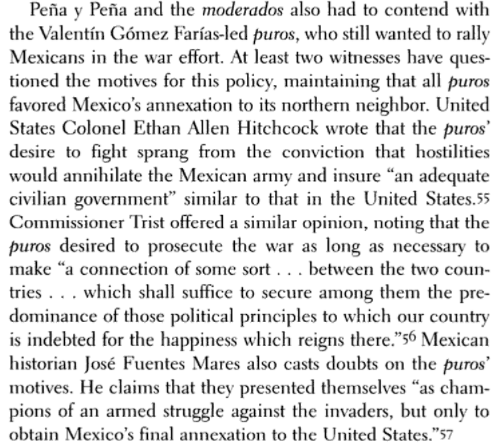Have all of the all of Mexico annexation movement succeed - after much wrangling and negotiating, arrangements are made with the locals that, if not satisfying to both sides, at least keep things cordial, ie, local land rights are respected, basic rights are extended, Mexico gets stability, some increased trade, and mostly left alone by DC, though there is some talk about organizing states.
Then comes the Civil War - despite expectations that Mexican nationalists may take advantage of the Civil War to secede, instead, dozens of volunteer regiments are organized by Mexican-Americans to fight for the Union, many looking to enjoy the idea of wiping out slavery early on, and to kill a few of the Dixie Golden Circle bastards, so much the better. Several divisions from Mexico cover themselves in glory fighting in Texas, and alongside Grant and Sherman throughout the South. Post-Gettysburg, alongside the likes of Nevada, West Virginia and Nebraska, several states are admitted from the more populated core of Central Mexico while Lincoln is President, with several territories organized in Northern Mexico.
Post-Civil War, there is a new sense of unity between at least the Yankees and the Mexicanos - both fought to preserve the Union, and to eliminate slavery. During reconstruction, the gilded age and Western Expansion, railroads and factories go up in Mexico, creating much wealth, and hewing America and Mexico even closer together. While there is some suspicion because they're Papists, English is increasingly spoken in the Mexican states, even if it is one heavily seasoned with the local Spanish. The various Mexican states become a favored destination for Irish and Italian immigrants because of how they treat Catholics, even if the local elites still look down on the newcomers. The Northern Mexican territories draw the usual mix of Western settlers, with some additional settlers from central Mexico, and even pretty well off groups of freedman.
Over the next few decades, several other Hispanic regions are annexed to the United States - everything North of the Darien gap, (sans British Belize), Cuba, Puerto Rico and the Philippines, with Mexico serving as not only a blueprint for how to integrate them, but one of the main pushers for annexation - they've embraced the American idea of Manifest Destiny as a way to (slowly) increase their voting bloc.
By the OTL 1950s, the various Mexican states is seen as American as Texas or Louisiana or Arizona, even if the region has an odd, slowly declining form of American English, Spanglish, comparable to the German-heavy versions of the midwest, or the various Cajun languages of former French Louisiana. Oddly enough, racially, Mexicans are seen as white, more than even Italians or Irish, or more often than not Puerto Ricans and Filipinos, or god forbid, those Guatemalans and Hondurans.
While there is a "Hispanic/Latino" identity, there is a hierarchy to it of sorts.
Tejanos, Mexicans are Cubans are white, and have been integrated into American culture for years - John Wayne is well known for his taste in Mexican women and wives, and all of America watches Lucille Ball and Desi Arnaz on TV every night, while Fidel Castro, Mickey Mantle and Joe Dimaggio have turned the Yankees into a dynasty. Politically, the Mexican states are often wild cards in elections, though they tend to vote GOP or pro-Catholic Democrats - it's expected that Vice President Nixon will pick Mexican Senator and oil tycoon Lazaro Cardenas (R-MX) as his running mate in 60.
Then, there are the Filipinos and Puerto Ricans. Filipinos may be in for some change in those fortunes soon, with President Eisenhaur set to admit Luzon and Visayas as states alongside Alaska and Hawaii, Manila is the pearl of American Asia, and deeply important for American power projection in Asia. A generation of American GIs, sailors and Marines coming home with Filipina wives has also sped things along. Puerto Ricans are still looked down upon, more so now for "why can't you lazy bastards be more like the Cubans or Mexico?" made somewhat worse by Puerto Rico still dragging it's feet on committing to statehood. Some things never change.
Near the bottom of American society - save perhaps African Americans in the deep South or the Irish up North - are the various Central American peoples. While Panama may have earned statehood from the Canal, the rest are territories mostly exploited for resources and cheap labor. Racial stereotypes about people from this region are common and popular, and unless you're an American soldier or working for the various fruit companies here, life here is poor and often miserable. Mexican-Americans are famously vocal about their disdain for their southern cousins - the fastest way to start a fight with a Mexican-American is to call them Guatemalans and Hondurans. There is some hope the long talked about canal in Nicaragua may change fortunes in the region, but it's only talk for now.
